Speaker Bios and Abstracts
2023 Nature of Place Symposium
"Faith and the Environment"
Aug. 23 – 24
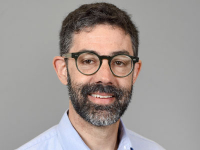
Dr. Evan Berry
Associate Professor of Environmental Humanities in the School of Historical, Philosophical and Religious Studies at Arizona State University
KEYNOTE SPEAKER
Evan Berry is an Associate Professor of Environmental Humanities in the School of Historical, Philosophical, and Religious Studies at Arizona State University. He previously taught at American University and Lewis and Clark College. His research examines the relationship between religion and environmental issues, especially climate change. Berry is the author of Devoted to Nature: The Religious Roots of American Environmentalism (University of California Press, 2015) and editor of Climate Politics and the Power of Religion (Indiana University Press, 2022). Berry previously spent a year as a Franklin Fellow at the State Department’s Office of Religion and Global Affairs and has served as the President of the International Society for the Study of Religion, Nature, and Culture and as the Chair of the American Academy of Religion’s Committee for the Public Understanding of Religion.
Abstract
Can Theology Save the Planet?
The climate crisis is a complex challenge: it impacts communities and ecosystems in very different ways, yet requires coordinated international action to help speed the transition away from fossil fuels. Addressing the climate crisis is in part about government policies, but also very much about changing societal patterns and mobilizing all types of stakeholder groups. For decades, faith traditions and religious groups have been scrutinized for both their contributions to and obstructions of climate action, but what conclusions can be drawn from a close examination of the history of religious engagement with climate change? What role does religion truly play in environmental change making? We will focus on how different religious communities approach climate issues differently, and on the aspects of the climate crisis that are most closely associated with religious life.
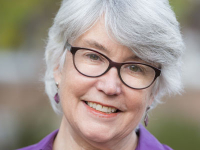
Dr. Laurel Kearns
Professor of Ecology, Society, and Religion at Drew Theological School
KEYNOTE SPEAKER
Dr. Laurel Kearns is Professor of Ecology, Society and Religion at Drew Theological School/University in New Jersey, where she has taught since 1994. During this time, she has helped eco-justice to become rooted in the Drew theological school curriculum so that there is now a required course: "Global Faiths and the Earth." Her research is focused on religious involvement in ecological issues and movements, with a particular interest in environmental justice, climate change, and food. In addition to co-editing and contributing to EcoSpirit: Religions and Philosophies for the Earth and Religion and Nature in North America, she has contributed chapters to volumes such as The Oxford Handbook on Climate Change and Society; The Elements: Bloomsbury Handbook on Religion and Nature; Grounding Religion: A Field Guide to the Study of Religion and Ecology; The New Evangelical Social Engagement; Quakers, Creation Care, and Sustainability; and Living Cosmology: Christian Responses to Journey of the Universe. She is a co-founder of the Green Seminary Initiative and serves on the board of the Parliament of World Religions. Her decades-long involvement in religious environmentalism has roots in the island where she grew up, Sanibel, Florida, which recently, like many islands, was significantly impacted by climate change.
Abstract
We Only Have One Planet: Con-spiring Together?
All religious traditions share some form of gratitude for the gifts of life—the air we breathe, the water, land and food that nourishes us—as well as gratitude for the more ineffable, the sense of beauty and awe, of being connected to nature, however it is understood. Religious environmentalists recognize that we only have one planet, and the need to draw on that gratitude to work together and harness the potential of interfaith cooperation based on those religious values. How are religious practitioners working together, or not? Building on decades of research on religious environmentalism with a particular focus on interfaith cooperation, and starting with the simple insight that we all breathe the same air, we con-spire together, this talk asks what insights can be gained starting with taking a deep breath. This summer has made many more in eastern and midwestern Canada and the U.S. keenly aware of air quality, an awareness that others, in western North America, in the historical, or not-so-historical, memory, of industrial cities like Pittsburgh, in urban areas around the globe, already have about the impact of the quality of the air we breathe. Those who unjustly bear the brunt now, and in the future, of air pollution and climate change, which after all, respect no boundaries, ask us to conspire together, across religious, social, economic, political and geographic divides. What are some successful models of this kind of interfaith work? What language and messages work and don’t work as well? Fresh from the gathering of the Parliament of World Religions in Chicago, with a major focus on climate concerns, Laurel Kearns will discuss a range of successful examples. In return, she looks forward to hearing insights and stories of what has worked for members of the audience.
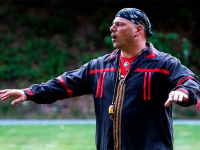
Chief Adam Waterbear DePaul
Chief, Tribal Storykeeper and Director of Education of the Lenape Nation of Pennsylvania
Adam Waterbear DePaul is a Chief of the Lenape Nation of Pennsylvania, where he serves as Tribal Storykeeper and Director of Education. He collaborates with academic institutions on initiatives related to the Lenape people, including land acknowledgements, mascots & representation, programming, and curriculum development. Adam is a PhD candidate at Temple University and a Scholar-in-Residence at Arcadia University, where he teaches classes in World Mythology, Lenape Legends, and Punk Rock. Adam co-curates the Lenape Cultural Center in Easton PA and the exhibit Enduring Presence 2022: Lenape Nation of Pennsylvania Art at Haverford College.
Abstract
Harmony and Humility: Nature and "Environment" in Lenape Spirituality and Culture
Chief Adam Waterbear, Tribal Storykeeper and Director of Education for the Lenape Nation of Pennsylvania, will discuss the interconnectedness of human beings and the "natural world" in Lenape spirituality and living culture. In the Lenape language, there is no word such as "environment," which draws a line between humans and nature. From the earliest Lenape stories of creation and cosmology to the contemporary wisdom of Lenape elders, harmony and humility toward all living things is paramount. Chief Adam will discuss some of these cultural stories and the way in which the Lenape of Pennsylvania live by these lessons in carrying on their role as stewards of their indigenous homelands today.
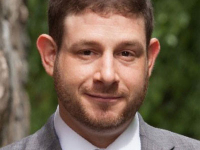
Rabbi Andy Shugerman
Rabbi Andy Shugerman is the inaugural Development Director at Congregation Beth Shalom, a position created to advance the financial, environmental, and spiritual sustainability of a century-old facility at the top of Squirrel Hill. He previously served congregations in Louisiana and New York and has led nonprofit organizations through transformative change process efforts since his ordination in 2009 from the Jewish Theological Seminary. He credits his training in congregation-based community organizing (CBCO) for giving him the tools to build vision-oriented collaborative action teams.
Abstract
Spirituality and Sustainability: How We Walk our Theology at Beth Shalom
Over the past five years, the Beth Shalom clergy have led a member-driven process to advance a multi-faceted strategic plan for greater sustainability and community engagement. Last year, the State of Pennsylvania awarded the synagogue $1 million in matching funds to prepare for installing a solar roof above our sanctuary. This session will tell part of that story and reflect on how our connectedness to God and to nature both inspire and help to articulate why we are undertaking work to reduce our carbon footprint. We will look at texts regarding God's continued and sustaining relationship with nature, which is constantly degrading and renewing, beginning and ending all at once.
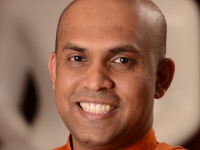
Rev. Dr. Bhante Pemaratana
Chief Monk, Pittsburgh Buddhist Center and Cleveland Buddhist Vihara
Bhante Soorakkulame Pemaratana is the chief monk of Pittsburgh Buddhist Center and Cleveland Buddhist Vihara. Born and trained in Sri Lanka, he moved to the US in 2008 and earned a PhD in Religious Studies from the University of Pittsburgh in 2017. He teaches Buddhism, mindfulness, and meditation and provides spiritual counseling to help people to deal with challenging issues of life.
Abstract
Caring for All Life
A key Buddhist concept is that all life including plants are interrelated and interdependent. Each living organism has a distinctive role to play for the wellbeing of the whole system. Buddhism does not see humans as a category that is separate from other sentient beings and intrinsically superior. They are a part of an interdependent system. However, as the most evolved sentient beings, humans have a greater responsibility to preserve the nature and be compassionate to all living things
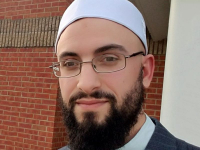
Imam Chris Caras
Islamic Center of Pittsburgh
Chris Caras converted to Islam as a high school junior in October 2001 in his hometown of Peoria, Illinois. He studied Islam formally in Saudi Arabia and Malaysia, earning degrees in Arabic, Islamic theology, history and legal theory, in the Arabic medium and with honors. He worked in St Louis, Missouri for the Council on American-Islamic Relations (CAIR), and taught for a private Islamic school while serving as an imam on the Illinois side of East Saint Louis. In summer 2019, Chris became the Imam for the Islamic Center of Pittsburgh. Chris’ wife of 15 years is an accomplished Quran recital teacher originally from Pakistan. The introverted couple have three rambunctious tykes.
Abstract
Islamic Motifs of Environmental Responsibility
Imam Chris Caras will take attendees on a tour of Islamic teachings towards our environment, and the cultures inspired. From the earth we walk on to the water we drink, animals and plants we live among, and humans we live with. Learn how Islamic scriptures, from the Quran to the words of the Prophet Muhammad, have inspired civilizations for 1,400 years.
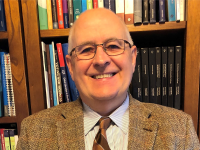
Dr. Gerry Magill
Vernon F. Gallagher Chair for the Integration of Science, Theology, Philosophy, and Law at Duquesne University
Dr. Gerard Magill holds the Vernon F. Gallagher Chair for the Integration of Science, Theology, Philosophy, and Law at Duquesne University (appointed in 2007) where he is a tenured Professor in the Center for Global Health Ethics. In 1987 he graduated with his Ph.D. degree from Edinburgh University in Scotland. From 1987 he developed his scholarly career at Saint Louis University where in 1996 he was appointed as the Department Chair of the Center for Healthcare Ethics. As Executive Director of that Center from 1999, he held multiple appointments including being a member of the Council of Deans for the University’s health sciences campus, a Division Director in the Department of Internal Medicine at the University Hospital, a member of the University’s Institutional Review Board, a member of the Hospital Ethics Committee, a Professor in the School of Medicine (secondary appointment), and a Professor in the School of Public Health (secondary appointment). He has authored, co-authored, or edited 15 books including a recently co-authored book on Governance Ethics in Healthcare Organizations (Routledge 2020). He has published over 85 scholarly and professional articles and he has given over 250 scholarly presentations at conferences. He is a member of 18 Professional Associations. He has extensive experience on Institutional Review Boards, Hospital Ethics Committees and Ethics Consultation Services. In 2015, he was appointed by Duquesne University’s President to be Chair of the Committee for the annual endowed conference series on the Integrity of Creation. Each conference results in a co-edited book – 6 books have been published so far. In addition to the above, in 2021, he was appointed as Senior Research Fellow in Duquesne University’s new ethics Center, the Carl G. Grefenstette Center for Ethics in Science, Technology and Law.
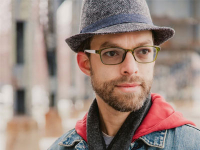
Rev. John Creasy
Executive Director of Garfield Community Farm and founding pastor of The Open Door Church
Rev. John Creasy is the founding executive director of Garfield Community Farm, a permaculture based non-profit in Pittsburgh, PA. He is also a founding Pastor at The Open Door Church. John lives with his family a mile from the farm in Stanton Heights where they practice permaculture in their 90 year old home with rainwater collection, solar power, off grid heating and a garden that has overtaken the entire property. In addition to farming John and his wife Alyssa love hiking and backpacking with their kids and creating music with their band This Side of Eve.
Abstract
Finding Hope for Creation
The Christian and Jewish scriptures present God as Creator of all that is and humanity as being created in the image of this creator. Humanity, a part of creation, are gifted with the ability and responsibility of creativeness. Through our power for creativity, humanity is given responsibility for the care of all creation. Could it be that creation is awaiting for humanity to take our rightful place as the creative caretakers we were created to be? With our scriptures as inspiration, and belief in a God present with all creation, people of faith can become leaders in sustainability and ecological design to bring restoration to our planet.
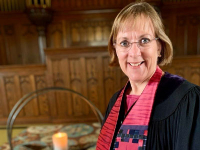
Rev. Dr. Kate R. Walker
First Unitarian Church of Pittsburgh
The Rev. Dr. Kate R. Walker, (she/her/hers) began serving the First Unitarian Church of Pittsburgh in August of 2021. Previously she served the Mount Vernon Unitarian Church in Alexandria, Virginia, and the Meadville Unitarian Universalist Church, in Pennsylvania. She was raised Unitarian Universalist and is a double UU preacher’s kid. She received her BA in Communications from the University of Denver, an MA in Social Ecology from Goddard College in Plainfield, Vermont, an M.Div. from Starr King School for the Ministry in Berkeley, California. She received her Doctor of Ministry from Virginia Theological Seminary in Alexandria, Virginia. She is an avid outdoor enthusiast, enjoying biking, hiking, sailing, camping, and staring at the stars. She is a mountain gal, but will walk on the beach if available. She lives in Pittsburgh with her husband Mark and two deeply loved Springer Spaniels.
Abstract
Let The Circle Be Broken
Like many faiths, Unitarian Universalists, embrace the circle as a sacred symbol. “Circle of love and community,” is a lovely phrase, warming our hearts, and providing a beautiful metaphor for inclusivity. Weddings are one of my favorite rituals I get to be a part of. For the ring exchange, I talk about the circle with words about the circle of life, rings like the circling of the earth wrapping around the sun, and the beauty of love bound in a circle, unbroken. Yet, I believe the circle is the wrong metaphor for what humanity faces with climate crisis and suffering around the world, particularly for marginalized communities. The circle needs to be broken as a symbol and an image for the sacredness of life. What is a better religious and secular metaphor that requires a fundamental change in how we look at life?
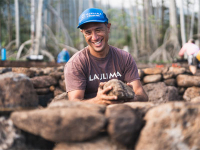
Dr. Kawika Winter
Biocultural Ecologist at the Hawai'i Institute of Marine Biology; University of Hawai'i at Mānoa
Dr. Kawika Winter is a biocultural ecologist at the Hawai`i Institute of Marine Biology (University of Hawai`i at Mānoa). As a transdisciplinary scientist he leverages science toward changing laws and policies for a more sustainable future that is grounded in Indigenous wisdom.
Abstract
Indigenous Wisdom to Navigate Us into the Future
Many recognize the value of Indigenous knowledge as solutions to our contemporary problems, but Indigenous leaders around the world are increasingly calling for using Indigenous wisdom to navigate us into our future. But how can this be done when the modern world seems to be growing in a direction that is more and more distanced from Indigenous lifeways? One way to do this is by envisioning a global ecocivilization, one that marries Indigenous perspectives and values with modern technology. By looking to Indigenous ecocivilizations of the past, we can begin to see the outlines of a sustainable future for our planet. This talk will highlight some of the biocultural restoration work that is happening in Hawai`i, which shows us how the foundations to a global ecocivilization might be built.
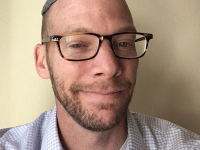
Rabbi Mark Asher Goodman
Rabbi Mark Asher Goodman (he/him) is Associate Rabbi of Congregation Beth Shalom in Pittsburgh, PA. A native of Los Angeles, he was ordained in 2006 at the Ziegler School of Rabbinic Studies and has since served several communities in California and Colorado. He recently published a book, 'Life Lessons from Recently Dead Rabbis: Hassidut for the People', a spiritual self-help book arranged according to the weekly Torah portion.
Abstract
Spirituality and Sustainability: How We Walk our Theology at Beth Shalom
Over the past five years, the Beth Shalom clergy have led a member-driven process to advance a multi-faceted strategic plan for greater sustainability and community engagement. Last year, the State of Pennsylvania awarded the synagogue $1 million in matching funds to prepare for installing a solar roof above our sanctuary. This session will tell part of that story and reflect on how our connectedness to God and to nature both inspire and help to articulate why we are undertaking work to reduce our carbon footprint. We will look at texts regarding God's continued and sustaining relationship with nature, which is constantly degrading and renewing, beginning and ending all at once.
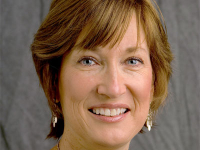
Dr. Paula Kane
John and Lucine O'Brien Marous Chair of Contemporary Catholic Studies and Professor of Religious Studies at the University of Pittsburgh
Paula Kane is the John and Lucine O’Brien Marous Chair of Contemporary Catholic Studies and Professor of Religious Studies at the University of Pittsburgh. She teaches courses on American religious history, global Christianity, Catholicism, and religion and media. Among her books are Separatism and Subculture: Boston Catholicism 1900-1920 and Sister Thorn and Catholic Mysticism in Modern America. She received her Ph.D. in American Studies from Yale University.
Abstract
Principles and Profits in Early Pennsylvania: Did religion matter?
William Penn’s colony, drawing immigrants mostly from England and Wales, soon became known as “the best poor man’s country” due to the rich natural resources available. It was also a religiously diverse colony, extending far beyond Quakers. To engage the conference theme of faith and the environment, we shall examine contrasts and connections between the outlook of European Christian colonists and native inhabitants on the natural world. Is it a place to exploit for ownership and profit or is it a place to revere as the source of all being? How did settlers and natives regard the natural world, and how were they both affected by their mutual relationships?
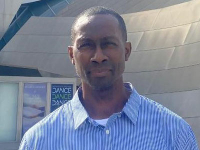
Dr. R. Khari Brown
Sociology Professor at Wayne State University
Dr. Brown is a sociology professor at Wayne State University where teaches classes and does research on the sociology of religion. In 2021, The University of Michigan Press published his book, Race and the Power of Sermons on American Politics. This book examines the impact of race on the relationship between religion and social justice attitudes and political activism in the United States. His new book project examines how race and faith impact congregational involvement in grass-roots social justice activism, including environmental activism. Dr. Brown is co-investigator of National Politics Study, a bi-annual study that assesses American political attitudes and behaviors and religious life. He also regularly consults for the Pew Research Center.
Abstract
Race, Religion, and Congregation-based Environmental Activism
Despite being in located in more impoverished communities that are hotter and have worse air and water quality with more limited access to safe and well-maintained forests and parks, Black Protestant congregations are not over-represented among religious congregations involved in efforts aimed at raising members’ consciousness about environmental conservation and/or advocacy efforts. A large reason for this is that Black Protestant congregations tend have fewer of the resources necessary for such activities, such as having highly educated and well-paid clergy and highly educated members, than do their predominantly White and multi-racial Mainline Protestant and Jewish counterparts. Conversely, predominantly White and multi-racial Evangelical Protestant congregations are the least likely to participate in environmental-related programing and activism. Their under-representation is partially linked to their clergy and congregational bodies maintaining theologies and political ideologies that place them more at odds with environmental conservation than do their non-Evangelical peers.
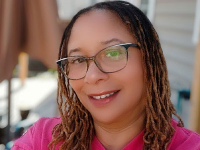
Robin Lewis
Director of Climate Equity at Interfaith Power and Light DMV
Robin Lewis, an EJ activist and organizer, has a long history of helping others become more sustainable and inclusive. As a certified project manager, she held leadership roles at various technology companies. She is now the Director for Climate Equity at Interfaith Power and Light DMV, educating Black churches and other BIPOC faith communities on environmental issues, creating a local affiliate of Green The Church, and promoting community involvement in the EJ movement. She has worked on campaigns about trash incineration, water quality, renewable energy, to name a few. She is on the Board of WhyHunger and leads her church on social justice issues. She has a BA and MBA from Rutgers University, and a MA in Sustainable Urban Planning from George Washington University.
Abstract
Let’s Talk Environmental Justice and Climate Change!
Explore the history of the environmental justice movement and how it has expanded to become a comprehensive approach to both the natural and the built environments. We will also explore how BIPOC, and lower income communities are suffering because of climate and other environmental hazards since they have not historically received equitable distribution of financial resources when faced with catastrophic climate events. Finally, we will discover things we can do to help to promote environmental justice in our communities and beyond.


